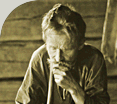 |
| Main page | Background | Villages | Revitalisation | Cultural tourism | Map | |
Latvajärvi |
Latvajärvi Latvajärvi in the 1990s Audio sample |
|
Lönnrot, who rarely tells anything about the bards he met or even mentions their names, was inspired to describe his meeting with Arhippa thus: After spending only a short time in this village (Kivijärvi), I went on another ten kilometers to the remote village of Latvajärvi, where everyone praised the bardic gifts of a certain Arhippa. This old man was over eighty but his memory was still amazingly sharp. For two days, and part of a third, in fact, he kept me busy recording poems. He sang them in the proper order, with few serious gaps, and most were items I had not obtained anywhere before; indeed, I wondered if they were to be had anywhere else anymore. I was thus very happy that I had decided to visit him. Who knows whether I would have found him alive had I come later. If he had died before my meeting him, a great deal of our ancient poetry would have gone to the grave with him....Although Arhippa's house was a poor one, it seemed more cheerful than that of many wealthier people. Everyone in the household respected him as they would an ancient patriarch, and this was certainly a status he had in my eyes as well.. The figure becomes even more impressive if one compares it to the total number of lines in the Kalevala: some 12,000. One realizes that his contribution accounted for over one-tenth of the material Lönnrot had at his disposal when "composing" the Kalevala.
The diverse landscape of the village is characterized by hills and the swampy valleys between them. Many a year the frost has risen from these valleys to claim the crops while still on the stalk, and many of the well-known residents of Latvajärvi have had to resort to "counting chimneys", or begging from house to house, at various times in their lives.
Arhippa himself considered his father "Ivan the Great" to be many times better than himself as a singer and told Lönnrot that he felt his own sons would never become accomplished bards. But he was wrong here, for later collectors have recorded almost 70 poems, nearly 3,500 lines, sung by Arhippa's youngest son, Miihkali. Miihkali's life was by no means an easy one. He had to support
seven children of his own and the children of his two deceased brothers.
In addition to farming and fishing as best he could in Karelia,
he had to look for work in Finland, where he learned to sew furs
and dress sheepskin. Miihkali lost his sight in 1865 and lived the last 34 years of his life blind. Despite this disability, he did not stop working: he went from village to village working hand mills, crushing and grinding pine bark, making fishing nets, and the like. Sometimes he was forced to beg as well. He was finally spared this indignity, however, when the Finnish Literature Society awarded him a modest annual pension as the last great bard, a distinction for which he most gratefully acknowledged "the powers-that-be in Helsinki." Miihkali was one of the most sought-after bards. In the 1870s, Borenius and Berner came to record his poems. In the following decade, it was Juvelius and Varonen, and in 1894 he was visited by Kusti Karjalainen and I.K. Inha. The photographs taken by Inha have made Miihkali the symbol of the Viena bards. This status became all the greater with the erection in Vuokkiniemi in 1991 of a statue of Miihkali by the sculptor Alpo Sailo. The earliest photographs of Miihkali date back to 1872 and were taken by Berner.
|
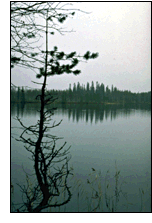 Latvajärvi
is the most important of the bardic villages in Viena. The island
of Kalmosaari there is a shrine of Finnish and Karelian culture
- the grave of Viena's greatest bard, Arhippa Perttunen.
Latvajärvi
is the most important of the bardic villages in Viena. The island
of Kalmosaari there is a shrine of Finnish and Karelian culture
- the grave of Viena's greatest bard, Arhippa Perttunen.
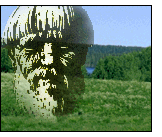
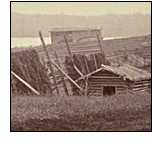 The
village of Latvajärvi is located along the Maaselkä Ridge
on the hills forming the eastern shore of the small lake which gives
the village its name. The village includes the nearby hill Mantsonvaara,
an island in the middle of the lake, the hills Vasonvaara, Nauvunvaara
and Hoapavaara, as well as the more distant settlements of Kossi
and Lapukka. At the turn of the century, Latvajärvi comprised
slightly more than fifty households.
The
village of Latvajärvi is located along the Maaselkä Ridge
on the hills forming the eastern shore of the small lake which gives
the village its name. The village includes the nearby hill Mantsonvaara,
an island in the middle of the lake, the hills Vasonvaara, Nauvunvaara
and Hoapavaara, as well as the more distant settlements of Kossi
and Lapukka. At the turn of the century, Latvajärvi comprised
slightly more than fifty households. 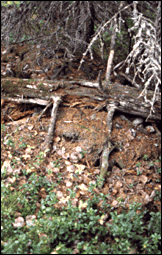
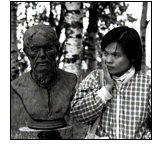 Epic
poetry was not Arhippa Perttunen's only forte. The sequences he
sang also provided dozens of the lyric poems in the Kanteletar.
Väinö Kaukonen considers him to be a lyric poet on a par
with Mateli Kuivalatar, a noted bard from Ilomantsi.
Epic
poetry was not Arhippa Perttunen's only forte. The sequences he
sang also provided dozens of the lyric poems in the Kanteletar.
Väinö Kaukonen considers him to be a lyric poet on a par
with Mateli Kuivalatar, a noted bard from Ilomantsi.
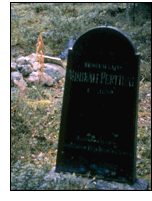 The
Finnish Literature Society, which had awarded Miihkali a pension
while he was alive, chose to honor his memory by erecting a stone
monument on his grave; it is a tribute which is unique in the graveyards
of Viena.
The
Finnish Literature Society, which had awarded Miihkali a pension
while he was alive, chose to honor his memory by erecting a stone
monument on his grave; it is a tribute which is unique in the graveyards
of Viena.